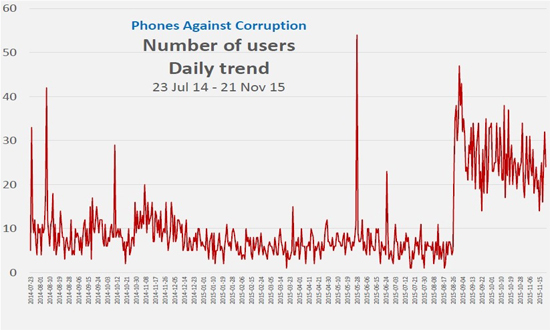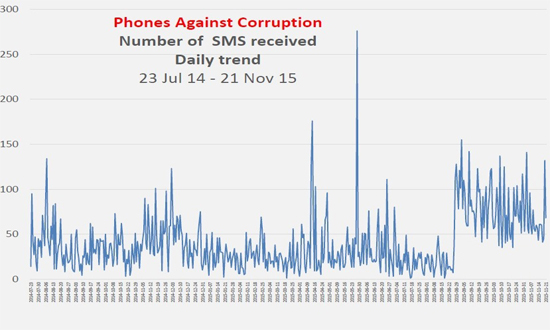Phones Against Corruption
Truth-by-phone: How PNG is pitting the humble mobile phone against massive corruption
Papua New Guinea stands at one of the most decisive junctures in its development.
With predicted record levels of economic growth of 20% for 2015, the country has a unique opportunity to leverage significant sustainable and equitable improvements of Human Development of the more than 7 million Papua New Guineans. However, in 2013, government task force estimated that almost 40% of PNG's annual budget (approx. USD 6.5 billion) was lost to corruption and mismanagement, a worrying number that seems to be confirmed by Transparency International's 2013 Corruption Perception Index, and the World Bank's Global Governance Corruption Index.
Encouraging the reporting and denouncing of corruption is difficult in a culturally communitarian and complex environment with over 850 languages, where the benefit of the community and the wantok (clan) system is an end that justifies most means. While the abuse of public trust for individual benefit is seen as inappropriate, most citizens do not know where and how to denounce corruption and often fear violent retribution, corruption reporting mechanisms need to be expanded across the country.
That's where UNDP's Phones Against Corruption Initiative comes in, offering an alternative safe space for reporting corrupt practices. Tested with 1,200 staff of the Department of Finance (DoF), UNDP helped introduce a corruption reporting tool through mobile messaging. Easily accessible, anonymous and free of charge to the general public, this crowdsourcing approach is expected to be made available to the general public in a year's time.
During the launch of the initiative on July, 2014, one DoF staff greeted this initiative with enthusiasm, stating that whistle-blowers have been living in fear, but Phones Against Corruption now gives us confidence to report misconduct.And the enthusiasm is reflected in the use of Phones Against Corruption. Since the launch of the initiative in July this year, 1,538 text messages have been received from 384 different users, as of September this is an average of 41 messages per day. All reported cases are referred to the DoF's Internal Audit and Compliance Division for further investigation in collaboration with relevant state bodies responsible for criminal investigations and prosecution.
And now the ripples are spreading beyond PNG. The Australian-based SMS software provider, Mobimedia, has received requests from Bangladesh, Fiji, and other countries in the Asia-Pacific region, about the effectiveness of this tool in combating corruption for possible replication in those countries in the near future.
Related Link:Truth-by-phone: How PNG is pitting the humble mobile phone against massive corruption
Other related links
Graph (1) - Daily Trend with regard to the number of Users
The graph below displays the latest statistics on number users of the SMS system on a daily basis.

Graph (2) - Daily Trend with regard to the number of SMS
The graph below displays the latest statistics on the number of SMS recieved on a daily basis.


